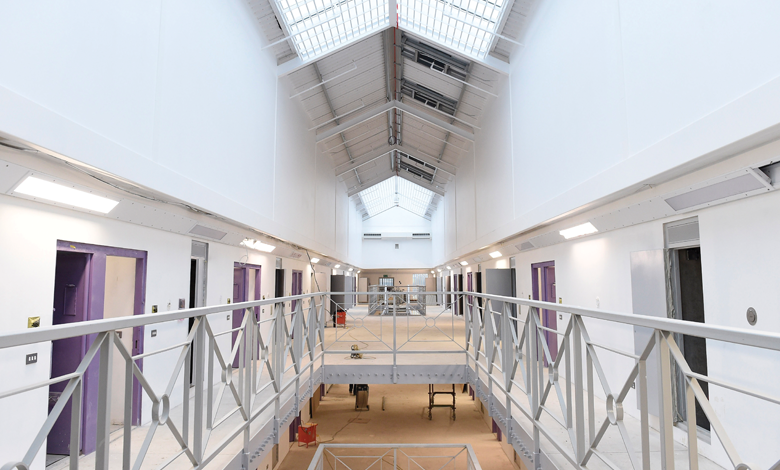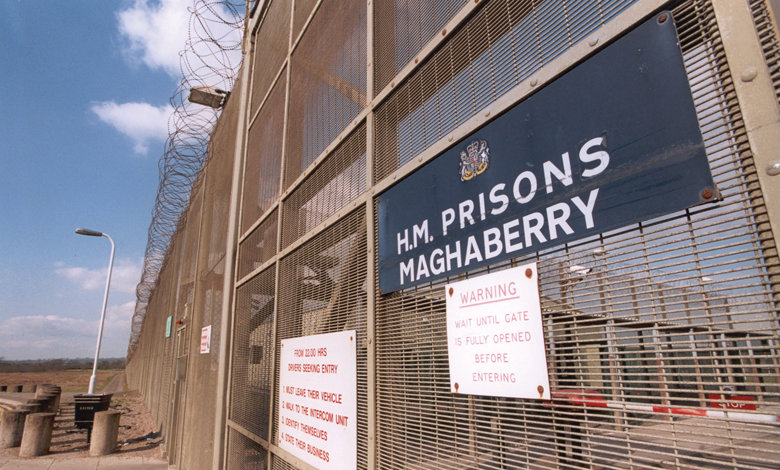Digital solutions to supporting delivery of prison frontline services

Robbie Burrows, Head of ICT Services at the Northern Ireland Prison Service (NIPS), outlines some of the digital solutions that are supporting NIPS frontline services in their efforts to rehabilitate prisoners. He describes two innovative ICT work strands, mobile devices apps for officers and Prisoner Portal, that have been integral in these efforts.
Burrows describes the wider use of mobile device apps for staff as being transformational for the officers, giving them the ability to work more closely with prisoners and record more accurate information in a shorter timeframe. “Officers have incredibly busy posts and this technology supports NIPS in their efforts to effectively manage interventions, help with inmate care, manage prisoner rewards more accurately, thus providing better support for their rehabilitation and care and reducing the administrative burden on officers,” he says.
An example of a tablet app is for Prisoner Rewards and Earnings. Burrows states that a challenge faced by staff was that records of positive things a prisoner would do was recorded on paper and then was input into the system later. The app changed this process and improved the accuracy of the data as it is now recorded immediately.
“Quite often in the past, what was happening was prisoners would do positive things and this would get written onto a bit of paper and it could be forgotten about because a staff member might have an emergency to deal with at that time,” he says.
“Staff have a high level of demand placed on them and so this cycle would often repeat itself. This increases tension in a jail and can eventually culminate in serious safety issues for both inmates and officers.”
“Suppliers are now involved in all of our developments and as a result, the developments are getting a lot better because they are working very closely with the business and our ICT Services team.”
Robbie Burrows, Head of ICT Services at the Northern Ireland Prison Service (NIPS)
The other project is the introduction of Prisoner Portal, a platform that allows prisoners to buy their own tuck shop products, choose their own meals, and look up their cash balance. This application is used in approximately 500 cells and the use of the platform is useful for the inmate as it introduces them to technology and gives them a chance to learn some transferrable skills. However, it also helps the business processes in the prison work more effectively, again reducing the administrative burden on officers.
While Burrows is cognisant of the risks of such devices being available to prisoners, and the project has some issues to deal with, including inmate damage and delays during Covid, he says there is much to gain of enabling some prisoners to gain transferrable ICT skills to assist with their rehabilitation.
Emphasising the importance of rehabilitation Burrows states that the digital solutions being used by the Prison Service, especially the tablet apps and Prisoner Portal, are having the important effect of increasing prisoners’ responsibilities for their own lives.
“In Northern Ireland, there are no full life term inmates, which means that every prisoner is scheduled for eventual release, so the importance of rehabilitation being at the heart of the digital strategy developed by and for the Northern Ireland Prison Service cannot be underestimated.”
Burrows, who has held the role of Head of ICT Services at the Prison Service since 2012, gives a statistical overview of reoffending rates in Northern Ireland.
In the 2019/2020 year, Department of Justice figures show that almost half, over 45 per cent, of prisoners released reoffended within one year of being released. Of these reoffending prisoners, more than half reoffended within three months of their release, and more than two thirds, 70 per cent, of released prisoners reoffended within six months of their release.
This ICT progress has been enabled by a “gentle culture change” from the ICT Strategy agreed in 2017. Under the NIPS ICT Governance Board NIPS operational managers assumed responsibility for the business and Burrows takes the lead role for the ICT Services, so the projects that come together in the NIPS strategic work programme can work in a safe place to develop.
This direct responsibility for leading projects “taking the pressure off the people involved in projects” and the environment created of “the project team comes together from different organisations, but work as one to work together to achieve a common aim for NIPS” has accelerated progress and digital development in NIPS.
“The project team comes together from different organisations, but work as one to work together to achieve a common aim for NIPS.”
In addition to this, the Northern Ireland Prison Service ICT/Digital Strategies since 2017 meant that there was a formalised approach to ICT and digital development, and a work programme agreed with the business, which more closely aligns and supports the delivery of NIPS business targets. NIPS leadership has been and continues to play a key role in this work, and their support has been appreciated throughout both strategic periods. Burrows states that the NIPS leadership support has very much increased the pace and scale of the progress.
Burrows states that the increased use of digital technology has been “transformational” for the frontline Prison Service staff and the help and skills of these same staff have been vital to the developments. These projects have been developed working closely with NIPS staff who have brought significant business knowledge and developed a digital skillset. “Within a prison, having these skills is very important because in prison it is a very different environment from your normal office environment,” he says. The ICT Services branch also play an essential role bringing the business and technology together, who he believes have “a set of business analysis and technical skills which are second to none”.
He further highlights the role played in the suppliers of the technology as “they bring a different set of skills to us which we do not have internally”.
“Suppliers are now involved in all of our developments and as a result, the developments are getting a lot better because they are working very closely with the business and our ICT services team. That has been absolutely brilliant for us,” Burrows says.
With an increased appetite from NIPS for digital projects, a leadership team that supports digital development, a growing set of skills from their ICT services, very close relationships with the business and strong support from suppliers, as well as a supportive culture and approach to use of digital technology, Burrows is optimistic that success can continue to be achieved and that the Prison Service can be supported further to continuously improve rehabilitation of prisoners.
Some of the other ICT projects successfully implemented in NIPS demonstrate the approach and spirit of working together. An example was the use of video calls for prisoners through the Covid-19 pandemic, which was ready for use within one month of the first lockdown.
The Prison Service took the view that the ability to remain in contact with family members had a positive effect on prisoner and family morale during the pandemic. Burrows anecdotally cites an example of a male prisoner who he says was “in tears” after seeing his dog “for the first time in years”.






